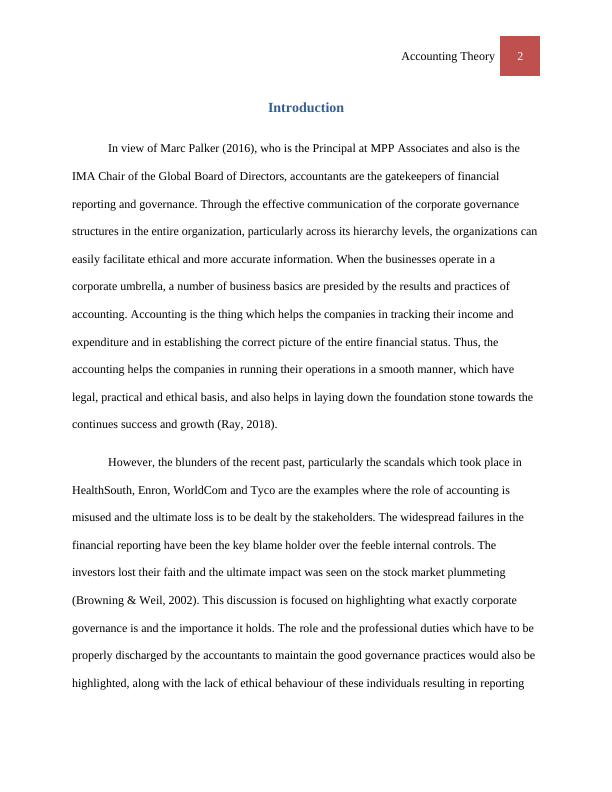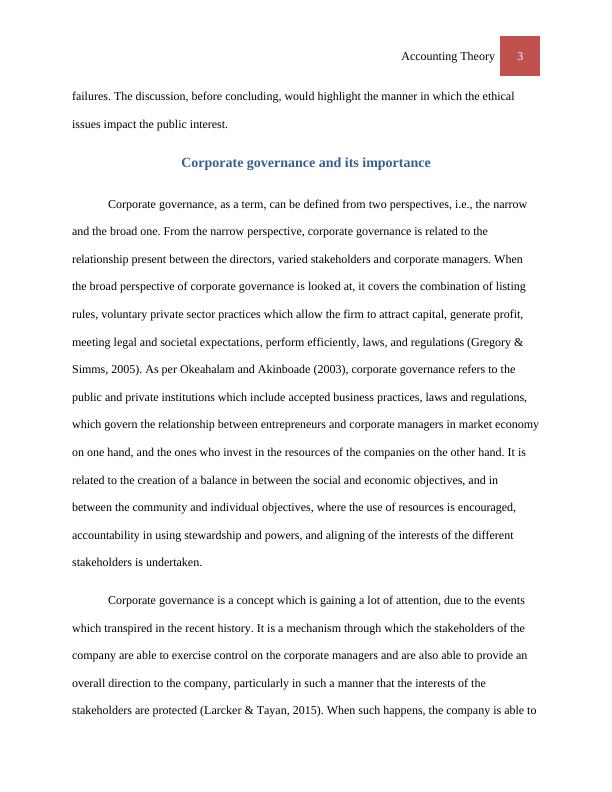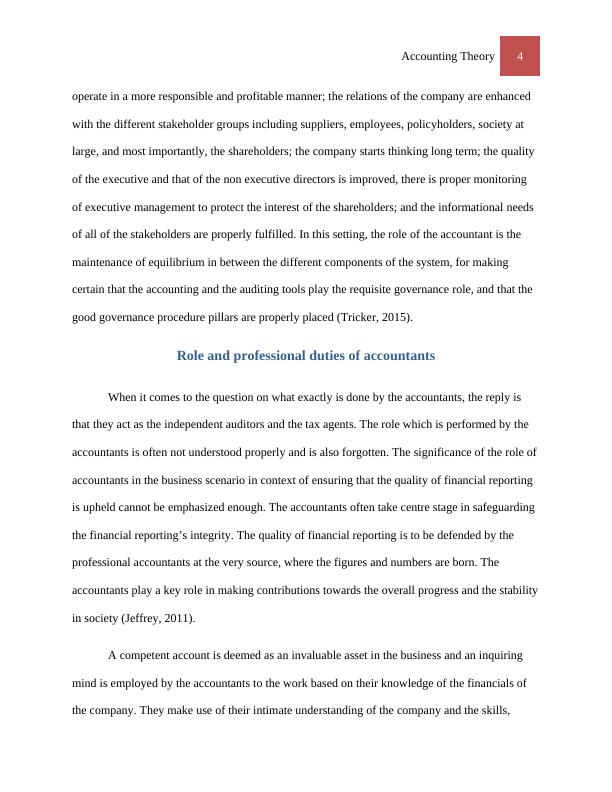Corporate Governance and the Role of Accountants in Maintaining Ethical Standards
Added on 2023-06-15
14 Pages3980 Words215 Views

Accounting Theory 2
Introduction
In view of Marc Palker (2016), who is the Principal at MPP Associates and also is the
IMA Chair of the Global Board of Directors, accountants are the gatekeepers of financial
reporting and governance. Through the effective communication of the corporate governance
structures in the entire organization, particularly across its hierarchy levels, the organizations can
easily facilitate ethical and more accurate information. When the businesses operate in a
corporate umbrella, a number of business basics are presided by the results and practices of
accounting. Accounting is the thing which helps the companies in tracking their income and
expenditure and in establishing the correct picture of the entire financial status. Thus, the
accounting helps the companies in running their operations in a smooth manner, which have
legal, practical and ethical basis, and also helps in laying down the foundation stone towards the
continues success and growth (Ray, 2018).
However, the blunders of the recent past, particularly the scandals which took place in
HealthSouth, Enron, WorldCom and Tyco are the examples where the role of accounting is
misused and the ultimate loss is to be dealt by the stakeholders. The widespread failures in the
financial reporting have been the key blame holder over the feeble internal controls. The
investors lost their faith and the ultimate impact was seen on the stock market plummeting
(Browning & Weil, 2002). This discussion is focused on highlighting what exactly corporate
governance is and the importance it holds. The role and the professional duties which have to be
properly discharged by the accountants to maintain the good governance practices would also be
highlighted, along with the lack of ethical behaviour of these individuals resulting in reporting
Introduction
In view of Marc Palker (2016), who is the Principal at MPP Associates and also is the
IMA Chair of the Global Board of Directors, accountants are the gatekeepers of financial
reporting and governance. Through the effective communication of the corporate governance
structures in the entire organization, particularly across its hierarchy levels, the organizations can
easily facilitate ethical and more accurate information. When the businesses operate in a
corporate umbrella, a number of business basics are presided by the results and practices of
accounting. Accounting is the thing which helps the companies in tracking their income and
expenditure and in establishing the correct picture of the entire financial status. Thus, the
accounting helps the companies in running their operations in a smooth manner, which have
legal, practical and ethical basis, and also helps in laying down the foundation stone towards the
continues success and growth (Ray, 2018).
However, the blunders of the recent past, particularly the scandals which took place in
HealthSouth, Enron, WorldCom and Tyco are the examples where the role of accounting is
misused and the ultimate loss is to be dealt by the stakeholders. The widespread failures in the
financial reporting have been the key blame holder over the feeble internal controls. The
investors lost their faith and the ultimate impact was seen on the stock market plummeting
(Browning & Weil, 2002). This discussion is focused on highlighting what exactly corporate
governance is and the importance it holds. The role and the professional duties which have to be
properly discharged by the accountants to maintain the good governance practices would also be
highlighted, along with the lack of ethical behaviour of these individuals resulting in reporting

Accounting Theory 3
failures. The discussion, before concluding, would highlight the manner in which the ethical
issues impact the public interest.
Corporate governance and its importance
Corporate governance, as a term, can be defined from two perspectives, i.e., the narrow
and the broad one. From the narrow perspective, corporate governance is related to the
relationship present between the directors, varied stakeholders and corporate managers. When
the broad perspective of corporate governance is looked at, it covers the combination of listing
rules, voluntary private sector practices which allow the firm to attract capital, generate profit,
meeting legal and societal expectations, perform efficiently, laws, and regulations (Gregory &
Simms, 2005). As per Okeahalam and Akinboade (2003), corporate governance refers to the
public and private institutions which include accepted business practices, laws and regulations,
which govern the relationship between entrepreneurs and corporate managers in market economy
on one hand, and the ones who invest in the resources of the companies on the other hand. It is
related to the creation of a balance in between the social and economic objectives, and in
between the community and individual objectives, where the use of resources is encouraged,
accountability in using stewardship and powers, and aligning of the interests of the different
stakeholders is undertaken.
Corporate governance is a concept which is gaining a lot of attention, due to the events
which transpired in the recent history. It is a mechanism through which the stakeholders of the
company are able to exercise control on the corporate managers and are also able to provide an
overall direction to the company, particularly in such a manner that the interests of the
stakeholders are protected (Larcker & Tayan, 2015). When such happens, the company is able to
failures. The discussion, before concluding, would highlight the manner in which the ethical
issues impact the public interest.
Corporate governance and its importance
Corporate governance, as a term, can be defined from two perspectives, i.e., the narrow
and the broad one. From the narrow perspective, corporate governance is related to the
relationship present between the directors, varied stakeholders and corporate managers. When
the broad perspective of corporate governance is looked at, it covers the combination of listing
rules, voluntary private sector practices which allow the firm to attract capital, generate profit,
meeting legal and societal expectations, perform efficiently, laws, and regulations (Gregory &
Simms, 2005). As per Okeahalam and Akinboade (2003), corporate governance refers to the
public and private institutions which include accepted business practices, laws and regulations,
which govern the relationship between entrepreneurs and corporate managers in market economy
on one hand, and the ones who invest in the resources of the companies on the other hand. It is
related to the creation of a balance in between the social and economic objectives, and in
between the community and individual objectives, where the use of resources is encouraged,
accountability in using stewardship and powers, and aligning of the interests of the different
stakeholders is undertaken.
Corporate governance is a concept which is gaining a lot of attention, due to the events
which transpired in the recent history. It is a mechanism through which the stakeholders of the
company are able to exercise control on the corporate managers and are also able to provide an
overall direction to the company, particularly in such a manner that the interests of the
stakeholders are protected (Larcker & Tayan, 2015). When such happens, the company is able to

Accounting Theory 4
operate in a more responsible and profitable manner; the relations of the company are enhanced
with the different stakeholder groups including suppliers, employees, policyholders, society at
large, and most importantly, the shareholders; the company starts thinking long term; the quality
of the executive and that of the non executive directors is improved, there is proper monitoring
of executive management to protect the interest of the shareholders; and the informational needs
of all of the stakeholders are properly fulfilled. In this setting, the role of the accountant is the
maintenance of equilibrium in between the different components of the system, for making
certain that the accounting and the auditing tools play the requisite governance role, and that the
good governance procedure pillars are properly placed (Tricker, 2015).
Role and professional duties of accountants
When it comes to the question on what exactly is done by the accountants, the reply is
that they act as the independent auditors and the tax agents. The role which is performed by the
accountants is often not understood properly and is also forgotten. The significance of the role of
accountants in the business scenario in context of ensuring that the quality of financial reporting
is upheld cannot be emphasized enough. The accountants often take centre stage in safeguarding
the financial reporting’s integrity. The quality of financial reporting is to be defended by the
professional accountants at the very source, where the figures and numbers are born. The
accountants play a key role in making contributions towards the overall progress and the stability
in society (Jeffrey, 2011).
A competent account is deemed as an invaluable asset in the business and an inquiring
mind is employed by the accountants to the work based on their knowledge of the financials of
the company. They make use of their intimate understanding of the company and the skills,
operate in a more responsible and profitable manner; the relations of the company are enhanced
with the different stakeholder groups including suppliers, employees, policyholders, society at
large, and most importantly, the shareholders; the company starts thinking long term; the quality
of the executive and that of the non executive directors is improved, there is proper monitoring
of executive management to protect the interest of the shareholders; and the informational needs
of all of the stakeholders are properly fulfilled. In this setting, the role of the accountant is the
maintenance of equilibrium in between the different components of the system, for making
certain that the accounting and the auditing tools play the requisite governance role, and that the
good governance procedure pillars are properly placed (Tricker, 2015).
Role and professional duties of accountants
When it comes to the question on what exactly is done by the accountants, the reply is
that they act as the independent auditors and the tax agents. The role which is performed by the
accountants is often not understood properly and is also forgotten. The significance of the role of
accountants in the business scenario in context of ensuring that the quality of financial reporting
is upheld cannot be emphasized enough. The accountants often take centre stage in safeguarding
the financial reporting’s integrity. The quality of financial reporting is to be defended by the
professional accountants at the very source, where the figures and numbers are born. The
accountants play a key role in making contributions towards the overall progress and the stability
in society (Jeffrey, 2011).
A competent account is deemed as an invaluable asset in the business and an inquiring
mind is employed by the accountants to the work based on their knowledge of the financials of
the company. They make use of their intimate understanding of the company and the skills,

End of preview
Want to access all the pages? Upload your documents or become a member.
Related Documents
Business Ethics and Corporate Governance: An Analysislg...
|9
|2171
|135
Failure of Corporate Governance in Carillion Plc Construction Companylg...
|14
|3824
|191
Understanding Corporate Collapse and Governance Practiceslg...
|9
|1488
|144
The corporate responsibility and governancelg...
|6
|1200
|11
Importance of Legal and Ethical Corporate Governancelg...
|6
|2661
|91
Corporate Governance: Shareholder vs Stakeholder Interestlg...
|10
|2514
|248
